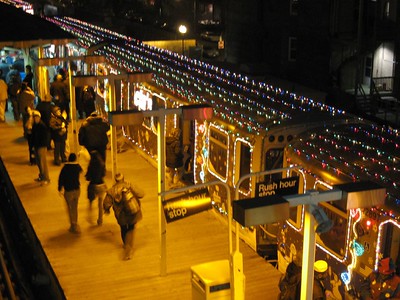
I recall a couple years ago, the first time I saw the CTA Holiday Train enter a station. It was packed, mainly with grandparents/aunts/uncles/cousins taking small ones for a ride. Probably generated a lot of revenue. Forward to 2020, a train crowded with people who breathe isn’t desired, so what to do?
Well, they could have just cancelled it, but that’d be dropping yet another tradition, and I suppose reducing overtime for union employees. So they’re going to run it empty, and instead of crowding the train, folks can crowd the platforms– probably a bit less close breathing.
But CTA trains run every day with people on them– the problem is the crowding. Why not sell tickets? How much would people pay for a ride in a semi-private car, restricted to, say 10 people per car? $25 for a 2-hour trip? $100? I don’t know, but it’s nontrivial. Maybe $1000/trip/car, $4000/trip/train, $160,000 assuming each space is sold just twice per operating day. Now, $160,000 is probably not quite enough to operate one bus for a year. But why not collect it?
Ideally, CTA would use the money to pay the cost of operation, and apply any left over to its growing deficit. But it might be more acceptable to have some sufficiently progressive charitable organization– United Way?– devise a system for distributing the proceeds to a politically-balanced array of groups actually assisting impoverished people. CTA could even reserve a certain number of tickets for actual impoverished folks who’d like to ride.
I wonder how much money a lobbyist could attract if paid $160,000?